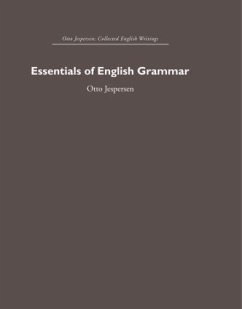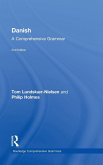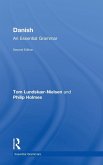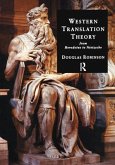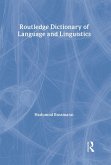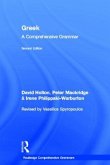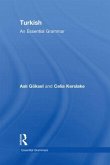Otto Jespersen
Essentials of English Grammar
Otto Jespersen
Essentials of English Grammar
- Gebundenes Buch
- Merkliste
- Auf die Merkliste
- Bewerten Bewerten
- Teilen
- Produkt teilen
- Produkterinnerung
- Produkterinnerung
This book was first published in 1933.
Andere Kunden interessierten sich auch für
![Danish Danish]() Tom Lundskaer-NielsenDanish192,99 €
Tom Lundskaer-NielsenDanish192,99 €![Danish Danish]() Tom Lundskaer-NielsenDanish200,99 €
Tom Lundskaer-NielsenDanish200,99 €![Western Translation Theory from Herodotus to Nietzsche Western Translation Theory from Herodotus to Nietzsche]() Douglas RobinsonWestern Translation Theory from Herodotus to Nietzsche172,99 €
Douglas RobinsonWestern Translation Theory from Herodotus to Nietzsche172,99 €![Routledge Dictionary of Language and Linguistics Routledge Dictionary of Language and Linguistics]() Hadumod BussmannRoutledge Dictionary of Language and Linguistics382,99 €
Hadumod BussmannRoutledge Dictionary of Language and Linguistics382,99 €![A History of the German Language Through Texts A History of the German Language Through Texts]() Thomas GloningA History of the German Language Through Texts173,99 €
Thomas GloningA History of the German Language Through Texts173,99 €![Greek Greek]() David HoltonGreek178,99 €
David HoltonGreek178,99 €![Turkish Turkish]() Celia KerslakeTurkish201,99 €
Celia KerslakeTurkish201,99 €-
-
-
Produktdetails
- Produktdetails
- Verlag: Taylor & Francis
- Seitenzahl: 390
- Erscheinungstermin: 16. Oktober 2006
- Englisch
- Abmessung: 235mm x 157mm x 25mm
- Gewicht: 714g
- ISBN-13: 9780415402446
- ISBN-10: 0415402441
- Artikelnr.: 22528088
- Herstellerkennzeichnung
- Libri GmbH
- Europaallee 1
- 36244 Bad Hersfeld
- gpsr@libri.de
- Verlag: Taylor & Francis
- Seitenzahl: 390
- Erscheinungstermin: 16. Oktober 2006
- Englisch
- Abmessung: 235mm x 157mm x 25mm
- Gewicht: 714g
- ISBN-13: 9780415402446
- ISBN-10: 0415402441
- Artikelnr.: 22528088
- Herstellerkennzeichnung
- Libri GmbH
- Europaallee 1
- 36244 Bad Hersfeld
- gpsr@libri.de
Jens Otto Harry Jespersen, a Danish linguist, specializing in English grammar. Steven Mithen referred to him as "one of the greatest language scholars of the nineteenth and twentieth centuries." Otto Jespersen was born in Randers, Jutland. As a kid, he was attracted by the work of Danish philologist Rasmus Rask, and he taught himself Icelandic, Italian, and Spanish using Rask's grammar. He enrolled in the University of Copenhagen in 1877 at the age of 17, originally studying law but also learning languages. In 1881, he changed his entire concentration to languages, and in 1887, he received his master's degree in French, with English and Latin as secondary languages. In June 1886, Jespersen joined the International Phonetic Association, which was then known as The Phonetic Teachers' Association. In fact, in a letter to Paul Passy, Jespersen proposed the notion of constructing a phonetic alphabet that could be utilized by all languages. From 1887 to 1888, he visited England, Germany, and France, where he met linguists like as Henry Sweet and Paul Passy and attended lectures at universities such as Oxford. On the recommendation of his professor Vilhelm Thomsen, he returned to Copenhagen in August 1888 to begin work on his PhD dissertation on the English case system. He successfully defended his dissertation in 1891.
1. Introductory 2. Sounds 3. Evolution of the sound system 4. Evolution of
the sound system - Continued 5. Evolution of the sounds system - Concluded
6. Spelling 7. Word-classes 8. The three ranks 9. Junction and nexus 10.
Sentence structure 11. Relations of verb to subject and object 12. Passive
13. Predicatives 14. Case 15. Person 16. Definite pronouns 17. Indefinite
pronouns 18. Pronouns of totality 19. Gender 20. Number 21. Number -
concluded 22. Degree 23. Tense 24. Tense - continued 25. Will and Shall 26.
Would and should 27. Mood 28. Affirmation, negation, question 29. Dependent
nexus 30. Nexus-substantives 31. The Gerund 32. The infinitive 33. Clauses
as primaries 34. Clauses as secondaries 35. Clauses as tertiaries 36.
Retrospect
the sound system - Continued 5. Evolution of the sounds system - Concluded
6. Spelling 7. Word-classes 8. The three ranks 9. Junction and nexus 10.
Sentence structure 11. Relations of verb to subject and object 12. Passive
13. Predicatives 14. Case 15. Person 16. Definite pronouns 17. Indefinite
pronouns 18. Pronouns of totality 19. Gender 20. Number 21. Number -
concluded 22. Degree 23. Tense 24. Tense - continued 25. Will and Shall 26.
Would and should 27. Mood 28. Affirmation, negation, question 29. Dependent
nexus 30. Nexus-substantives 31. The Gerund 32. The infinitive 33. Clauses
as primaries 34. Clauses as secondaries 35. Clauses as tertiaries 36.
Retrospect
1. Introductory 2. Sounds 3. Evolution of the sound system 4. Evolution of the sound system - Continued 5. Evolution of the sounds system - Concluded 6. Spelling 7. Word-classes 8. The three ranks 9. Junction and nexus 10. Sentence structure 11. Relations of verb to subject and object 12. Passive 13. Predicatives 14. Case 15. Person 16. Definite pronouns 17. Indefinite pronouns 18. Pronouns of totality 19. Gender 20. Number 21. Number - concluded 22. Degree 23. Tense 24. Tense - continued 25. Will and Shall 26. Would and should 27. Mood 28. Affirmation, negation, question 29. Dependent nexus 30. Nexus-substantives 31. The Gerund 32. The infinitive 33. Clauses as primaries 34. Clauses as secondaries 35. Clauses as tertiaries 36. Retrospect
1. Introductory 2. Sounds 3. Evolution of the sound system 4. Evolution of
the sound system - Continued 5. Evolution of the sounds system - Concluded
6. Spelling 7. Word-classes 8. The three ranks 9. Junction and nexus 10.
Sentence structure 11. Relations of verb to subject and object 12. Passive
13. Predicatives 14. Case 15. Person 16. Definite pronouns 17. Indefinite
pronouns 18. Pronouns of totality 19. Gender 20. Number 21. Number -
concluded 22. Degree 23. Tense 24. Tense - continued 25. Will and Shall 26.
Would and should 27. Mood 28. Affirmation, negation, question 29. Dependent
nexus 30. Nexus-substantives 31. The Gerund 32. The infinitive 33. Clauses
as primaries 34. Clauses as secondaries 35. Clauses as tertiaries 36.
Retrospect
the sound system - Continued 5. Evolution of the sounds system - Concluded
6. Spelling 7. Word-classes 8. The three ranks 9. Junction and nexus 10.
Sentence structure 11. Relations of verb to subject and object 12. Passive
13. Predicatives 14. Case 15. Person 16. Definite pronouns 17. Indefinite
pronouns 18. Pronouns of totality 19. Gender 20. Number 21. Number -
concluded 22. Degree 23. Tense 24. Tense - continued 25. Will and Shall 26.
Would and should 27. Mood 28. Affirmation, negation, question 29. Dependent
nexus 30. Nexus-substantives 31. The Gerund 32. The infinitive 33. Clauses
as primaries 34. Clauses as secondaries 35. Clauses as tertiaries 36.
Retrospect
1. Introductory 2. Sounds 3. Evolution of the sound system 4. Evolution of the sound system - Continued 5. Evolution of the sounds system - Concluded 6. Spelling 7. Word-classes 8. The three ranks 9. Junction and nexus 10. Sentence structure 11. Relations of verb to subject and object 12. Passive 13. Predicatives 14. Case 15. Person 16. Definite pronouns 17. Indefinite pronouns 18. Pronouns of totality 19. Gender 20. Number 21. Number - concluded 22. Degree 23. Tense 24. Tense - continued 25. Will and Shall 26. Would and should 27. Mood 28. Affirmation, negation, question 29. Dependent nexus 30. Nexus-substantives 31. The Gerund 32. The infinitive 33. Clauses as primaries 34. Clauses as secondaries 35. Clauses as tertiaries 36. Retrospect

